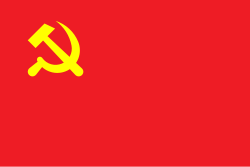
The Chinese Communist Party (CCP),officially the Communist Party of China (CPC),is the founding and sole ruling party of the People's Republic of China (PRC). Under the leadership of Mao Zedong,the CCP emerged victorious in the Chinese Civil War against the Kuomintang. In 1949,Mao proclaimed the establishment of the People's Republic of China. Since then,the CCP has governed China and has had sole control over the People's Liberation Army (PLA). Successive leaders of the CCP have added their own theories to the party's constitution,which outlines the party's ideology,collectively referred to as socialism with Chinese characteristics. As of 2024,the CCP has more than 99 million members,making it the second largest political party by membership in the world after India's Bharatiya Janata Party.

The Politburo of the Chinese Communist Party,officially the Political Bureau of the Central Committee of the Communist Party of China,is the highest political body of the Central Committee of the Chinese Communist Party.

The National Congress of the Chinese Communist Party is a party congress that is held every five years. The National Congress is formally the highest body within the Chinese Communist Party (CCP). Since 1987 the National Congress has been held in the months of October or November. The venue for the event,beginning in 1956,is the Great Hall of the People in Beijing. The Congress is the public venue for top-level leadership changes in the CCP and the formal event for changes to the Party's Constitution. In the past two decades the National Congress of the CCP has been pivotal at least as a symbolic part of leadership changes,and therefore has gained international media attention.

The Central Committee of the Chinese Communist Party,officially the Central Committee of the Communist Party of China,is the highest organ when the national congress is not in session and is tasked with carrying out congress resolutions,directing all party work,and representing the Chinese Communist Party (CCP) externally. It is currently composed of 205 full members and 171 alternate members. Members are nominally elected once every five years by the National Congress of the Chinese Communist Party. In practice,the selection process is done privately,usually through consultation of the CCP's Politburo and its corresponding Standing Committee.

Han Zheng is a Chinese politician who since 2023 has served as the 11th vice president of China. He previously served as the first-ranking vice premier of China between 2018 and 2023,and as the seventh-ranking member of the Politburo Standing Committee of the Chinese Communist Party (CCP) between 2017 and 2022.

Li Keqiang was a Chinese economist and politician who served as the seventh premier of China from 2013 to 2023. He was also the second-ranked member of the Politburo Standing Committee of the Chinese Communist Party (CCP) from 2012 to 2022. Li was a major part of the "fifth generation of Chinese leadership" along with Xi Jinping,the CCP general secretary and president.
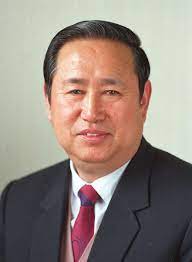
Jiang Chunyun was a Chinese politician most active in the 1980s and 1990s,who served as Vice-Premier,Vice-Chairman of the Standing Committee of the National People's Congress,and a member of the Politburo of the Chinese Communist Party.
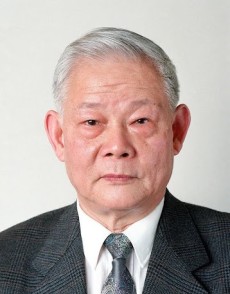
Ye Xuanping was a Chinese politician,who served as Mayor of Guangzhou from 1980 to 1985 and Governor of Guangdong,his native province,from 1985 to 1991. Ye was a strong supporter of Deng Xiaoping's reform and opening policy. Under his leadership,Guangdong grew economically prosperous and gained significant autonomy from Beijing. Concerned about his power,the national government manoeuvred to relieve him of the governorship,but allowed him to maintain his power base in Guangdong. He subsequently served as Vice-Chairman of the Chinese People's Political Consultative Conference from 1991 to 2003.
Zhang Baoshun is a retired politician of the People's Republic of China,and the former Communist Party Secretary of east China's Anhui province.

Li Jianguo is a retired Chinese politician who served as a member of the 18th Politburo of the Chinese Communist Party,Vice-Chairman of the National People's Congress,and Chairman of the All-China Federation of Trade Unions. He was formerly Communist Party Chief of Shaanxi and Shandong provinces;he also served as the Secretary-General of the National People's Congress.

The Xi Jinping–Li Keqiang Administration was the administration of China from 2013 to 2023. Xi Jinping and Li Keqiang succeeded Hu Jintao and Wen Jiabao after the 12th National People's Congress.
Zou Jiahua is a retired high-ranking politician of the People's Republic of China. He served as China's Vice Premier from 1991 to 1998,Vice-Chairman of the 9th National People's Congress from 1998 to 2003,and was a member of the Politburo of the Chinese Communist Party from 1992 to 1997.

Lou Qinjian is a Chinese politician and computer scientist who had served as Communist Party Secretary of Jiangsu,Communist Party Secretary,Governor of Shaanxi and Deputy Minister of Industry and Information Technology. He has a Ph.D. in computer science from Huazhong University of Science and Technology.
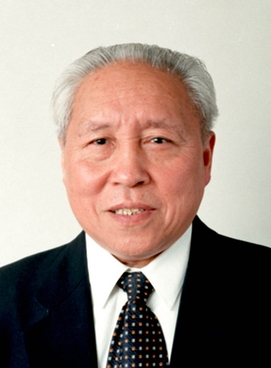
Yang Rudai was a politician of the People's Republic of China (PRC). He served as the Communist Party Chief of Sichuan,then China's most populous province,and was the first native Sichuanese to become the top leader of the province since the founding of the PRC. He was a member of the 13th Politburo of the Chinese Communist Party,the top governing body of China. Yang was considered a protégéof the purged reformist leader Zhao Ziyang.

Hou Zongbin was a Chinese politician. He served as Governor of Shaanxi Province from 1987 to 1990,as Communist Party Secretary of Henan Province from 1990 to 1992,and as Deputy Secretary of the Central Commission for Discipline Inspection from 1992 to 1998.

The 13thNational Congress of the Chinese Communist Party was held in the Great Hall of the People in Beijing from 25 October to 1 November 1987. It was preceded by the 12th National Congress of the Chinese Communist Party and was succeeded by the 14th National Congress of the Chinese Communist Party. It was attended by 1,936 delegates and 61 'specially invited' delegates representing more than 46 millions of party members and included 200 foreign journalists who were invited to attend the opening and closing ceremonies. In addition,the Vice Chairman of the Standing Committee of the National People's Congress and the CPPCC National Committee,representatives from the National Federation of industry and commerce,non-party people,ethnic minorities and religious people were invited to this congress as audience.

The 15th National Congress of the Chinese Communist Party was held in Beijing between September 12 and 18,1997. It was preceded by the 14th National Congress of the Chinese Communist Party and was followed by the 16th National Congress of the Chinese Communist Party. 2,048 delegates and 60 specially invited delegates represented the party's estimated 59 million members.

Xi Jinping Thought on Socialism with Chinese Characteristics for a New Era,commonly abbreviated outside China as Xi Jinping Thought,is an ideological doctrine created during General Secretary Xi Jinping's leadership of the Chinese Communist Party (CCP) that combines Chinese Marxism and national rejuvenation. According to the CCP,Xi Jinping Thought "builds on and further enriches" previous party ideologies and has also been called as the "Marxism of contemporary China and of the 21st century". The theory's main elements are summarized in the ten affirmations,the fourteen commitments,and the thirteen areas of achievements.
Cheng Andong is a Chinese politician who served as governor of Shaanxi from 1994 to 2002. He spent 10 years working at Gaokeng Coal Mine in Pingxiang before serving in various administrative and political roles in Pingxiang Mining Bureau. He joined the Chinese Communist Party (CCP) in June 1980.
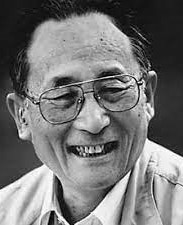
Quan Shuren was a Chinese politician who served as governor of Liaoning from 1983 to 1986,party secretary of Liaoning from 1986 to 1993,and chairman of Liaoning People's Congress from 1993 to 1998.
